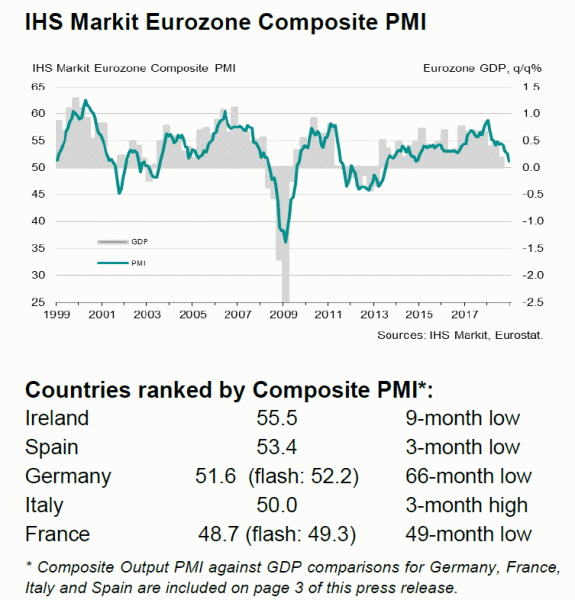Eurozone PMI services was finalized at 51.2 in December, down from November’s 53.4. PMI composite dropped to 51.1, down from prior month’s 52.7. It’s also the lowest level in over four years. Among the countries, France PMI composite worsened further to 48.7, a 49-month low. Germany PMI composite dropped to 51.6, 66-month low. Italy, on the other hand, recovered to 50, a 3-month high.
Chris Williamson, Chief Business Economist at IHS Markit said:
“The eurozone economy moved down another gear at the end of 2018, with growth down considerably from the elevated rates at the start of the year. December saw business activity grow at the weakest rate since late-2014 as inflows of new work barely rose. Levels of unfinished business are now falling for the first time in nearly four years as previously-received orders are not being fully replaced with new work.
“The data are consistent with eurozone GDP rising by just under 0.3% in the fourth quarter, but with quarterly growth momentum slowing to 0.15% in December.
“While a drop in business activity in France could be partly blamed on the ‘yellow vest’ protests, the rest of the region lacks any such mitigating factors, albeit with the recent weakness of the autos sector hopefully a temporary set-back.
“Importantly, with expectations of output dropping to the lowest for over four years, companies are not anticipating any imminent revival in demand. Worries reflect multiple headwinds from trade wars, Brexit, heightened political uncertainty, financial market volatility and slower global economic growth.
“Employment growth has already taken a knock as companies take a more cautious approach to hiring in the face of weaker order books. Jobs growth has hit a two-year low.
“Better news came in the form of an easing in price pressures to the lowest for over a year, which should provide some breathing space for the European Central Bank to review its policy guidance.”

